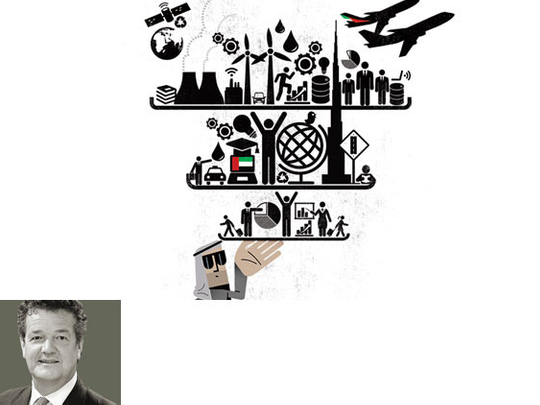
It is understandable that 60 per cent of young Emiratis are apprehensive about what the resident expatriates, who make up 85 per cent of the UAE’s population, might do to their society. However, it is important that this 60 per cent was only “worried” and not “frightened” or “angry” about the situation.
The main concerns of the Emirati students polled were maintaining their national identity, making sure that they had access to jobs when they need them and ensuring that while expatriates had every right to work and live in the UAE, they should not have political rights.
The figures were gathered by a student research team at Zayed University that presented its findings earlier this week at the Third Annual Conference of Dubai’s Scientific and Cultural Society which debated the theme of ‘The UAE through its Expatriates’ Eyes’. The comments on the Emiratis’ concerns emerged in the discussions that followed the presentation.
The Zayed University team surveyed their fellow students and recorded their lack of anger over the large number of expatriates in the country with a question about the impact of the foreign community on the UAE. Only 23 per cent said it had a negative effect, while 15 per cent said that it had a positive effect, but a very large 62 per cent said they were neutral about the impact of foreigners on their society.
“People looking at this survey should know that it does not show fear. It is all right to describe the mood as apprehension, but to say fear would be exaggerated,” said one of the participants in the survey.
Dr Suad Al Araimi was the discussant who summed up the research by commenting that “the UAE’s aspirations are larger than our numbers, so the expatriates are important for our goals and we have to live with the imbalance. We should not overlook, not deny the expatriates in our country. Expatriates have the right to seek jobs as long as they do not stop the rights of the nationals.”
The conference looked at how the UAE is home to people from 200 communities and nationalities, which constitute a large majority of the UAE’s total population and are recognised as an essential pillar of the economically vibrant and socially tolerant country and are welcomed by both government and citizens of the UAE.
Earlier in the day, several papers were presented that looked at the UAE’s social and economic model from the expatriate perspective. Dr Afaf Bataina commented from the perspective of the Arab expatriate, making the important point that the size of the expatriate community does not affect the close solidarity that the UAE citizens have with their leadership, which you cannot find in other Arab states.
She said that different Arabs are present in the UAE and while they share the Muslim and Arab culture and have a sense of belonging to the UAE, the UAE is not a melting pot and every nationality resident in the country maintains its identity. This makes it completely different from a country like the US with a large immigrant population where residents and applicants for nationality are expected to take on American traits.
The impact of long-term residence without legal security was picked up by Dr N. Janardhan who tackled the UAE from the Asian perspective, noting that the International Labour Organisation has defined the UAE expatriates as temporary contractual workers, which means they are in a permanent state of impermanence.
International citizens
Dr Janardhan also touched on a major issue for all expatriates when he described the identity crisis of the second or third generation of UAE expatriates, who are born and grow up in the UAE and have few cultural links with their supposed home country. They are effectively citizens of the world, but lack a secure home.
Despite this anomalous situation, he showed how many expatriates settle happily in the UAE, enjoying the work and society, not paying tax and benefiting from the UAE government spend of Dh14,066 per expatriate worker per year, while making an average contribution to the state of Dh2,507 per year in various fees and charges.
In a paper commenting on the situation from the British and European perspective, I offered the view that the British do not operate as a coherent community in the UAE. Most Britons see themselves as being part of the UAE and not part of a British community in the UAE. The nationality is not the defining social characteristic of the 120,000 Britons in the country. Despite the theoretical impermanence of the legal situation, with residency relying on a job and sponsorship, this is not a major issue for most expatriates.
Over the past three years, the UAE has experienced some very aggressive press in the UK and while this may have had a negative effect on the global image of the UAE, it has not altered the expatriates’ views, which have remained steadily favourable to the country they live in. In fact, as the economic situation in Britain and Europe remains depressed, the number of Europeans in the UAE has increased.
Throughout the conference, a common thread from both the UAE and expatriate sides was that something was happening in the UAE that was unique. It is a successful and ambitious economic model, seeking to deliver very ambitious goals for a very small native population.









